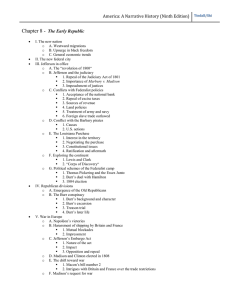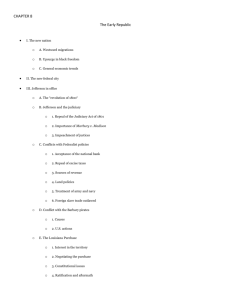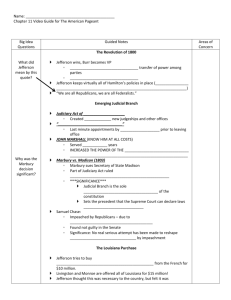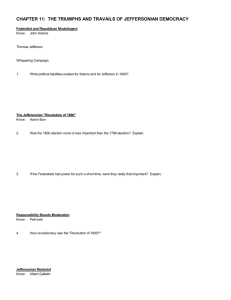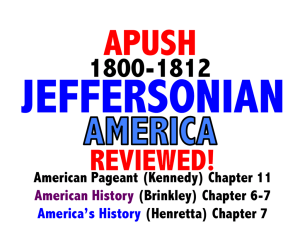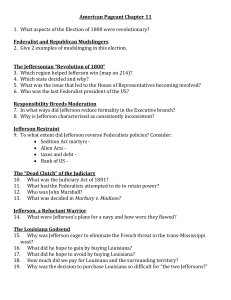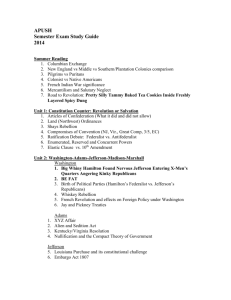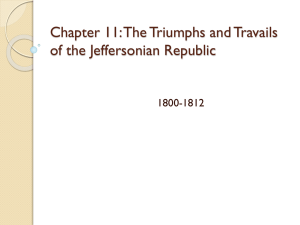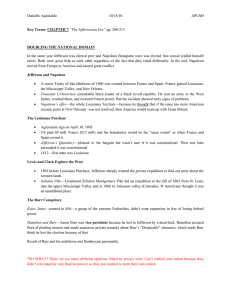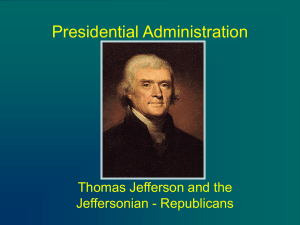PP Ch 11
advertisement
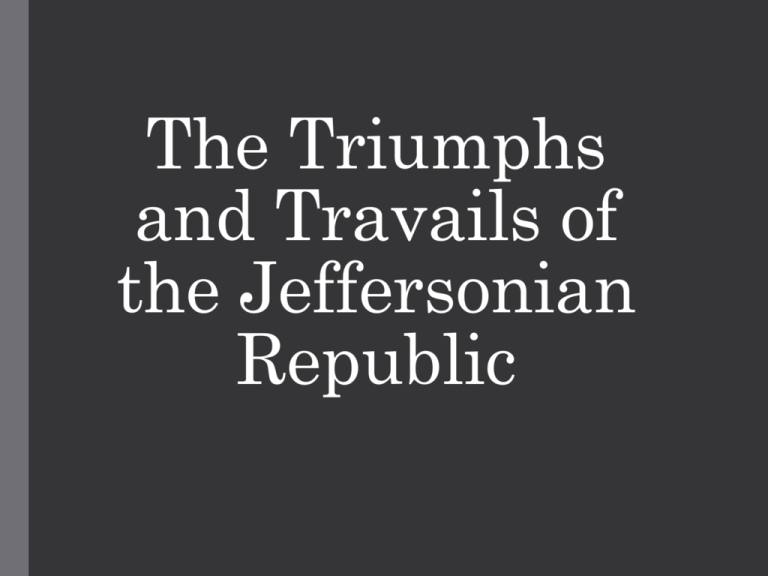
The Triumphs and Travails of the Jeffersonian Republic Federalist / Republican Mudslingers • First 2-party election War with France • Mudslinging Hamilton attacks Adams Pamphlet • Whisper campaigns Federalists attack Jefferson’s character Robbed widow Sally Hemings Church V. State Election of 1800 Nominee Thomas Jefferson John Adams Party Democratic Republican Federalist Home state Virginia Massachusetts Running mate Aaron Burr Charles Cotesworth Pinckney, John Jay Electoral vote 73 65 States carried 8 7 Popular vote 41,330 25,952 Percentage 61.4% 38.6% Jeffersonian Revolution • Jefferson is elected president Burr receives the same amount of votes Congress decides who will be vice president and who will be president Burr = Vice President • Twelfth Amendment Electors to cast separate ballots for president and vice-president Jeffersonian Republicanism • People should control the government Shrink the government Cut costs Balance Budget / Get out of debt Excise tax Alien-Sedition Reduced size of army Halted plans to extend the navy Lowered expenses for government social functions • Took office in the new federal capital Washington D.C. John Marshall • Judiciary Act of 1801 16 new federal judgeships/offices • President Adams filed paperwork while leaving office Midnight appointments Leave federalists in office • John Marshall Dominated the Supreme Court Shaped legal tradition Federalist Marbury V. Madison • Jefferson said appointments were not valid Told Madison (Secretary of State) not to deliver appointments • Federal chief justice = John Marshall Declared that part of the Judiciary Act of 1789 unconstitutional Would have ordered Madison to hand over papers • Decision strengthened the Supreme court Established Judicial Review Ability of Supreme Court to declare a law or act of Congress unconstitutional Louisiana Purchase • 1800 Spain ceded to France the trans-Mississippi Region of Louisiana = includes New Orleans 1802 Spain withdraws the right of deposit = Pinckney’s Treaty of 1795 • 1803 James Monroe / Robert R. Livingston Buy New Orleans + land to its east $10 Million Cont. • Napoleon decides to sell West Indies = Haiti Malaria Fear of an alliance with US and Britain • April 30, 1803 Louisiana Purchase $15 million 3-4 cents acre 828,000 square miles Exploration • Isolationist Removing Europe • 1804 Under direction of President Jefferson Explore the new territory Meriwether Lewis William Clark Sacajawea = Shoshone 33 men 2 ½ years Aaron burr • Burr Dropped 2nd Term Succession of New England and NY Hamilton exposed plan • Burr / Hamilton Duel Hamilton refused to fire Burr killed Hamilton with one shot • Separate Western part of the U.S. Neutrality • 1804 Jefferson reelected • Napoleon provokes war with Britain • Orders in Council British closed European ports under French control to foreign shipping Ships had to first stop at a British port • Napoleon orders the seizure of all merchant ships entering British ports Including American Cont. • Impressment Forcible enlistment of sailors 6,000 • Chesapeake Affair Surrender of 4 alleged deserters American commander refused demand Chesapeake fired upon Killing 3 wounding 18 The Hated Embargo • U.S. cut of exports • Trade = Canadian Border • Embargo Act 1807 • Enforcing legislations Forbade exports of all goods from the U.S. “Peaceful Coercion” Rights of Neutral Nations • Docks deserted • Soup Kitchens • Commerce Hurt Reviving Federalist party • Nullification • Repealed March 1, 1809 • Non Intercourse Act Opened Trade Except Britain / France Madison’s Gamble • 1808 Madison wins presidency • Macon’s Bill Britain or France repealed its commercial restriction America would restore its embargo against the nonrepealing nation Ally? Napoleon maneuvers to lift orders Britain saw no need to bargain U.S. reestablished the embargo Final step towards war Mr. Madison’s War • War inevitable • America needed to protect itself • Madison = Congress to declare war June 1, 1812 2 weeks later House 79 to 49 Senate 19 to 13 • Sectionalism Support = South / West Federalist = damned the conflict New England Resented Republican sympathy with Napoleon Opposed acquisition of Canada Sent supplies to Canada Refused militias to serve outside of their state
